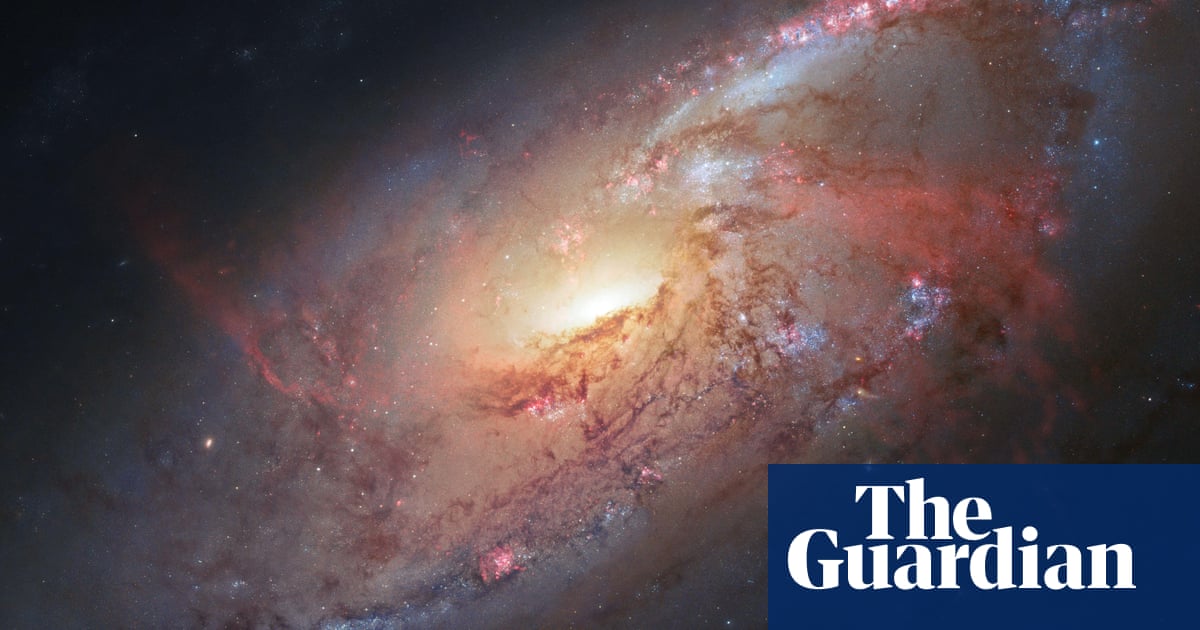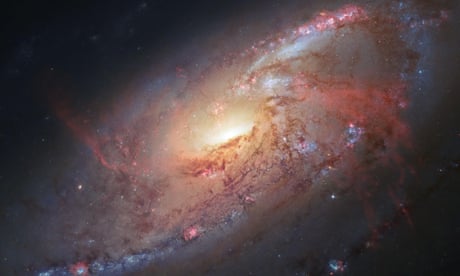
It is not “moving away from a certain point” – rather, all points are expanding away from all other points. So it’s not hubris at all; our place in the universe is as non-special and unremarkable as all other places. Readout_Noise
According to Men in Black, we’re in a big marble being thrown around by aliens. Doesn’t explain how the marble is expanding though, granted. AleYarse
Readers reply
I think Prof Harvey Keitel said it best in Mean Streets, when considering the meaning of an eternal spiritual life, the universe and everything: “Ya don’t fuck around with the infinite”. dylan37
** Most cosmologists believe the universe did not begin as a “mathematical singularity”, but instead as something better described as very small and dense. Stephen Hawking demonstrated that we cannot learn anything about the origin of the universe until it has aged at least 10⁻³² seconds, because no information has been created yet.
What’s beyond the universe? Simples! All those objects you’ve mislaid somewhere and never set eyes on since. Pens, glasses, wallets, keys, phones, penknives, combs, diaries, umbrellas, handkerchiefs … you name it!
Just because we don’t understand something doesn’t mean that it must therefore be the work of some kind of supernatural entity. That’s absurd. There are limits to what the human brain can comprehend – it is constrained by its evolutionary context. It’s simply not acceptable to explain the stuff we can’t get our heads around by invoking a cloud-dwelling divinity. Well, it might be acceptable to some people, but not to me. Oh, and the universe is expanding into itself. FirebirdV
In a joke that a quantum physicist might be able to explain, I said 42 before either of you. And after and at the same time, but in a different place. Sort of … Florton66
All we know, and this is what we mean by the expansion of the universe, is that, on average, every galaxy is getting increasingly far away from every other galaxy, at an increasing rate, with no central point. This does not mean that, at any local level, space-time is “stretching” like a rubber sheet (a common misunderstanding), nor does it mean that at local scales stars and galaxies can’t still fly into each other.
The question starts with an incorrect assumption – that the universe has as “edge”, a boundary between “universe” and “non universe”.
Scientists and astronomers tell us that the universe is expanding. But what is it expanding into, ie what’s beyond the universe?
Phil Town, Lisbon
My theory is that the universe has to expand to contain Brian Cox’s sense of self satisfaction. DonerCard
Einstein once said people used to think if you took everything out of the universe then you’d be left with space and time. Relativity says space and time would come out with the things. SidneyLotterby
Instead of thinking of the universe as inflating like a balloon, I think of it as a giant ball of dough being stretched in all directions by several chefs. So there’s always dough still at the original starting point. And with that, I’m hungry. Eva_Brick
* The edge of the “observable” universe is around 46.6bn light years in every direction; the distance to the big bang event, which is a much more speculative distance, is probably around 90bn light years in every direction.
*** Every point within the universe shares the same frame of reference of observing itself to be the oldest, most central and most distant point from the big bang event, as compared with any other point within the entire singularity. Even though new time and space is continuously unfolding our universe, it still maintains characteristics of the singularity of our origin. Chris Ducey
The universe is a clowns balloon that’s still in the blowing up stage and is about to be made into the shape of a sausage dog. Jamessss
I think it helps to realise the inseparable relationship between things and the physical dimensions of space and time. Any measurement of space involves looking at the distances between things and any measurement of time involves looking at the movement of things relative to each other. If you had a completely empty space, you would not be able to measure space or time. So, in that sense, a region of the universe that has nothing in it doesn’t even really exist before something moves into it. Shortordercook
Please email new questions to nq@theguardian.com
Hey, you beat me to it! That’s not fair! NellievKeep in mind that although there is no such thing as an “outside” to our singularity universe, there is no reason why an infinite number of singularities couldn’t exist, each with its own universe of continuously unfolding spacetime within.Has anyone noticed this thread is expanding? What I want to know is: what is it expanding into? Plovdiv12The universe is everything (as far as we know), so it doesn’t make sense to say “what is it expanding into”. It just is everything. The big bang happened “everywhere” at the same time. Is it infinite or finite? We don’t know. Even if it is finite, it might not have an “edge”. There are many unanswered or even unanswerable questions at the moment. We may never know, because all our measurements are constrained to the observable universe. csjjl1To say that “the universe is expanding” because what we can see and observe from our part of it that it looks to be moving away from a certain point sounds to me like hubris. haemodroidOur minds are not able to intuitively conceive of what the universe is really like. We see a balloon expand, and we see that it expands into the air around it, and we assume that the universe does the same. This is incorrect. The universe does not expand into anything because, as far as any evidence we have goes, it is everything that exists. In other words, there is nothing outside of the universe.
The problem with your question is you’re imagining something from your experience – say an inflating balloon – and asking the seeming reasonable: “What’s outside the ballon?” from the vantage point of being outside the balloon and being able to see it’s a balloon.
Don’t people realise that all space around is riddled with tiny wormholes, into which these objects sink, never to be seen by mortal eyes again? FirmlyDirac
We call the origin point of our universe the big bang event. This is the point, from our frame of reference, where new time and space began unfolding the universe. It is located about 90bn light years* in every direction within our 13.8bn-year-old universe. This counterintuitive observation is due to the fact that new time and space is continuously being created within the singularity** everywhere at once. The origin point of the universe has receded beyond our observable horizon; note that every other point in the universe shares a similar observed reference frame***.
42. PunkyRooster (and Parcival)
Instead, imagine this: you’re a cat, inside a flat. You’ve never been outside. So, as far as you know, nothing exists outside the flat. Now imagine you’re shrinking. From your feline perspective, you’re staying the same size, but all the walls and furniture seem to be moving further away from you – your universe is expanding. But you wouldn’t ask: “Where is it expanding into?” because as far as you know – and can ever know – the flat is all there is, it’s just spreading out (presumably, that’s just what flats do, because the only one you can ever observe does it). That’s the position we’re in and why the question doesn’t make sense. HaveYouFedTheFish
As a teacher, this is a question that often comes up in my physics lessons. Part of the problem is one of perspective. Human brains work best when thinking about things in as few dimensions as possible. We reduce the curved and lumpy surface of the Earth to two-dimensional maps, or two-dimensional streets to one-dimensional systems such as street numbers or mile markers.
We often think of the big bang as happening in space in the centre of the universe, but this is only partly true. What really happened is that the big bang is the universe. It was not an explosion in space; space is the explosion. The space between objects has been expanding ever since. The fact that this is unfathomable should make it all the more amazing. Andrew Busch
Mainstream cosmology is of the opinion that new time and space will continue to unfold within the singularity for ever; the universe will gradually grow cold and dark as static mass becomes more and more diffuse and energy undergoes continuous entropy (the “big rip” theory).


